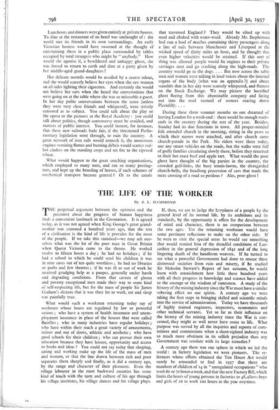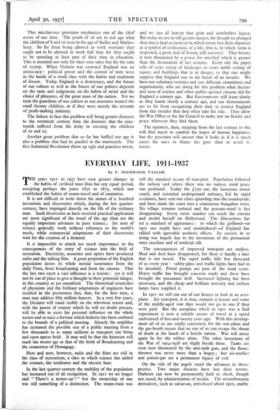THE LIFE OF THE WORKER
By J. L. HAMMOND
THE perpetual argument between the optimist. and the pessimist about the progress of human happiness finds a convenient landmark in the Coronation. It is agreed today, as it was not agreed when King George's great grand- mother was crowned a hundred years ago, that the test of a civilisation is the kind of life it provides for the mass of the people. If we take this standard—we may ask our- selves what was the lot of the poor man in Great Britain when Queen Victoria came to the throne. He worked twelve to fifteen hours a day ; he had no holidays ; if he had a school to which he could send his children it was in nine cases out of ten quite worthless ; he had no libraries or parks and few theatres ; if he was ill or out of work he received grudging help as a pauper, generally under harsh and degrading conditions. From that cavern of gloom and poverty exceptional men made their way to some kind of self-respecting life, but for the mass of people Sir James Graham's dictum that it was their lot to work, eat and sleep was painfully true.
What would such a workman returning today say of workmen whose hours are regulated by law or powerful unions ; who have a system of health insurance and unem- ployment insurance in place of the houses that were called Bastilles ; who in many industries have regular holidays ; who have within their reach a great variety of amusements, indoor and out of doors, athletic and aesthetic ; who have good schools for their children ; who can pursue their own education because they have leisure, opportunity and access to books and ideas ? You could not say today that sleeping, eating and working make up the life of the mass of men and women, or that the line drawn between rich and poor separates them sharply and finally, as it did a century ago, by the range and character of their pleasures. Even the village labourer in the most backward counties has some kind of touch with the taste and culture, of his age through his village institutes, his village dances and his village plays. If, then, we are to judge the happiness of a people by the general level of its normal life, by its ambitions and its standards, by the opportunity it offers for the development of mind and character, there is no comparison between the two ages. Yet the returning workman would have some pertinent reflections to make on the other side. If he were to visit the special areas he would see something that would remind him of the dreadful conditions of Lan- cashire in the general depression of 1842 and of the long lingering death of the handloom weavers.. If he turned to see what a powerful Government had done to rescue these distressed societies from ruin and misery, if he studied Sir Malcolm Stewart's Report of last autumn, he would learn with astonishment how little these hundred years with all their progress in knowledge and science. have added to the courage or the wisdom of statesmen. A study of the history of the mining industry since the War must have a similar sobering effect on our spirits. A century ago we were taking the first steps in bringing skilled and scientific minds into the service of administration. Today we have thousands of highly trained engineers, inspectors, economists and other technical servants. Yet so far as their influence on the history of the mining industry since the War is con- cerned, they might as well never have come to life. What purpose was served by all the inquiries and reports of com- mittees and commissions when a short-sighted industry was so much more obstinate in its selfish prejudice than any Government was resolute with its large remedies ?
A century ago there was one sphere in which we led the world : in factory legislation we were pioneers. The re- formers whose efforts obtained the Ten Hours Act would surely be astounded to find in 1937 that there are numbers of children of 14 in " unregulated occupations " who work 6o or 70 hours a week, and that the new Factory Bill, which limits the hours of young persons in factories to 48, allows boys and girls of 16 to work ioo hours in the year overtime. This mischievous provision emphasises one of the chief errors of our time. The youth of 16 are to our age what the children of 8 and to were to the age of Sadler and Shaftes- bury. So far from being allowed to work overtime they ought not to be allowed to work full time for they ought to be spending at least part of their time in education. This is essential not only for their own sakes but for the sake of society. When Victoria was crowned England was an aristocracy : political power and the control of taste were in the hands of a small class with the habits and traditions of leisure. Today England is a democracy, and the future of our culture as well as the future of our politics depends on the taste and judgement, on the habits of mind and the choice of pleasures, of the great mass of the nation. Yet we treat the guardians of our culture as our ancestors treated the small factory children, as if they were merely the servants of profit-making industry.
The failure to face this problem will bring greater disasters to the twentieth century than the disasters that the nine- teenth suffered from the delay in rescuing the children of to and 12.
Another great problem that so far has baffled our age is also a problem that had its parallel in the nineteenth. The first Industrial Revolution threw up ugly and graceless towns, and we can all lament that grim and comfortless legacy. But today we are in still greater danger, for though we plunged then into a fatal excitement in which towns lost their character as a symbol of civilisation, of a life, that is, in which form is respected, a great deal of beauty still survived. That beauty is now threatened by a power for mischief which is greater than the devastation of last century. Every day the paper tells of some sweep of landscape or some noble setting of square and buildings that is in danger, so that one might suppose that England was in the hands of an invader. We have our voluntary societies and our different committees and organisations, who are doing for this problem what doctors and men of science and other public-spirited citizens did for England a century ago. But Governments still learn slowly as they learnt slowly a century ago, and our Governments are so far from recognising their duty to protect England from this invader that they often take his side. They allow the War Office or the Air Council to make war on beauty and peace wherever they find them.
The optimist, then, stepping from the last century to this will find much to comfort his hopes of human happiness, but the pessimist will answer that it looks as if it is much easier for man to blame the past than to avoid its errors.



































































 Previous page
Previous page